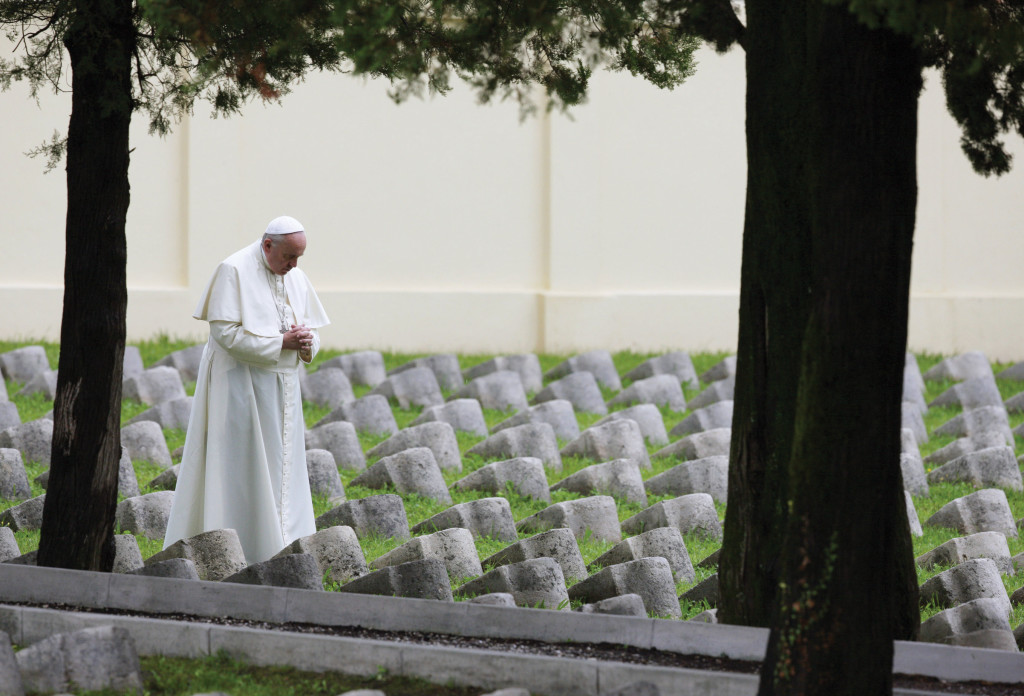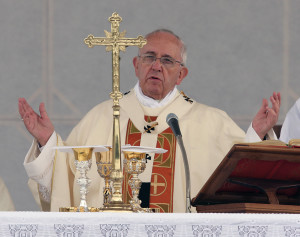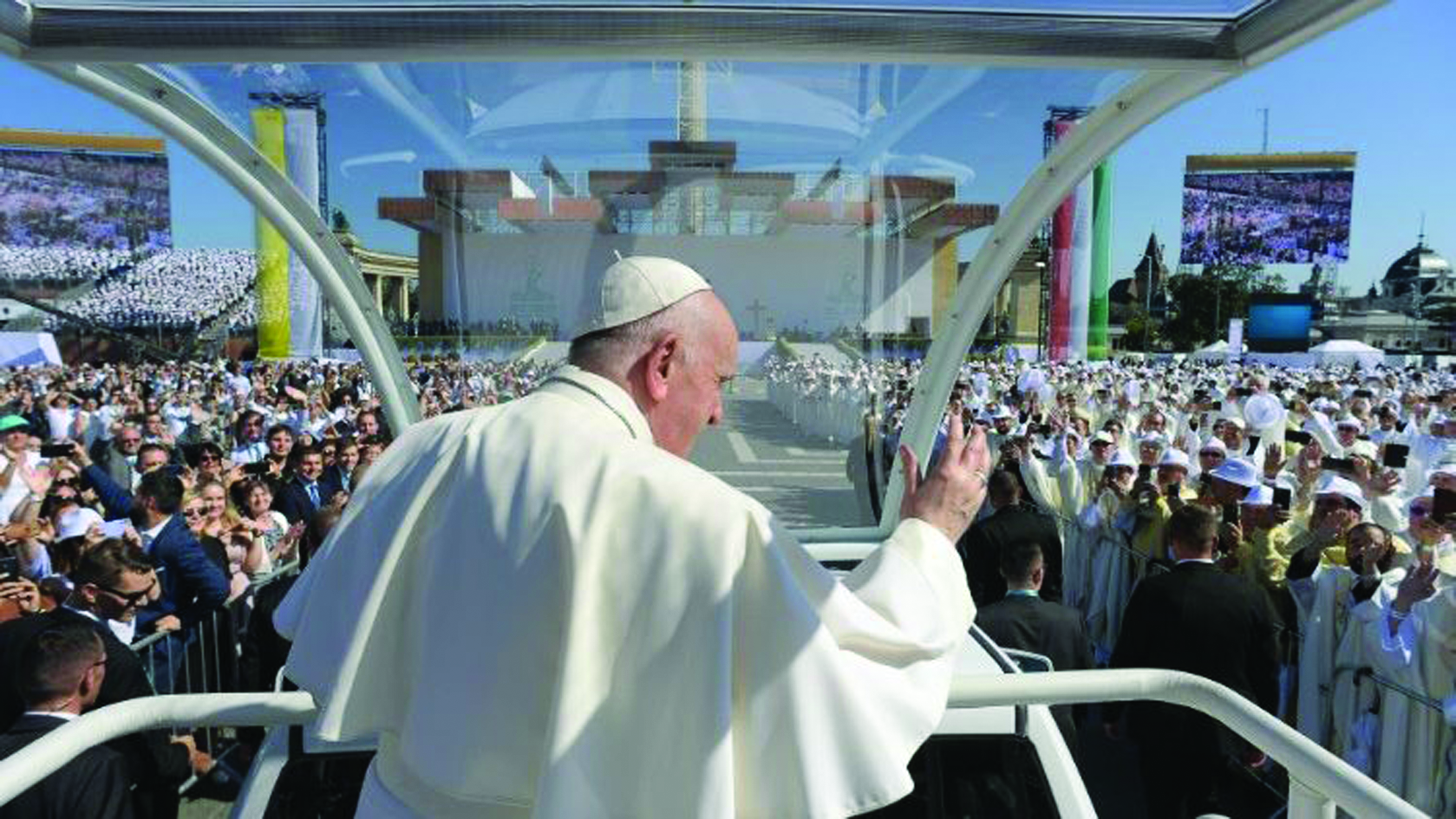“War is caused not only by those who wage it directly but also by those who do not do everything in their power to avoid it.”—St. John Paul II, 1979

Pope Francis in Redipuglia, Italy, visiting a war memorial that honors the 100,000 Italian soldiers who died during World War I.
Has “World War III” already begun, without any formal declaration? Perhaps… if Pope Francis is right.
This morning, Francis visited a cemetery in northern Italy, near Venice.
He went to the cemetery to commemorate soldiers who died in World War I, which began exactly 100 years ago, and continued for more than 4 years (Summer 1914-Autumn 1918).
In his reflection, Francis suggested that all of the “little wars” now occurring around the world — especially in the Middle East and in Ukraine — actually make up “World War III” which has already begun.
The devastation that a “World War III” is bringing and will bring, the suffering for all of us, means that those of us (even ordinary journalists) who would like to protect our families, our children, our parents, our friends, from harm, must do what we can to prevent the outbreak of such a tragedy.
Or, if the tragedy has already begun to unfold, we must do what we can to prevent it from unfolding completely — to stop it before it grows wider.
The Pope’s message today was essentially this: “No more war.”
Resolve disputes by peaceful means, by negotiation, by the use of reason, not by maiming and killing, Francis is saying.
And, like several of the Middle Eastern Christian Patriarchs who were in Washington D.C. in early September to draw attention to the sad plight of the region’s Christians, who are fleeing the region due to civil war, the Pope denounced the global armaments industry which provides weapons to all sides in these conflicts.
The mysterious army of ISIS (the “Islamic State of Iraq and Syria”), for example, has no technological infrastructure, no modern weapons factories, to produce the up-to-date weapons it is using. Whom do they get them from?
Essentially, the Pope and the Patriarchs are saying this: the world’s manufacturers of arms, and the merchants who sell those arms, have a real share in the responsibility for the death and destruction that follows the production and distribution of these weapons.
Francis and the Patriarchs are calling on all of us to “beat swords into plowshares” — to put the astonishing technological capacities of mankind at the service of human welfare, of the common good of all, of providing food, shelter, clothing, running water, for all, rather than to expend and explode our limited resources in the service of military agendas, costing countless lives.
To become effective good stewards of this fragile earth would take all of our energy and daring. All of our time and money. That would be a “battle” requiring commitment and courage.
But we are far from committing ourselves to such a noble “war.”
The words of Pope Francis and of the patriarchs are falling on deaf ears, and the relatively small global conflicts now occurring continue to widen and grow more numerous.
We must find a better way.
We are faced, in fact, with a spiritual battle, a battle for the soul of the West — and for the soul of Russia.
The West should return to its ancient Christian faith, and in that faith find a basis for friendship, collaboration, and the building globally of a just peace.
And Russia should do the same.
We should not be witnesses to a tragic Third World War.
The desired end is rather mutual conversion, truth-telling about our past, and then, a strong, mutually respectful America-Russia alliance — not a Third World War.
“Humanity needs to weep and this is the time to weep,” Francis said in the homily of a Mass during a visit to Italy’s largest war memorial — a large, Fascist-era monument where more than 100,000 soldiers who died in World War One are buried.
The Pope began his visit by first praying in a nearby, separate cemetery for some 15,000 soldiers from five nations of the Austro-Hungarian Empire which were on the losing side of the Great War that broke out 100 years ago.
“War is madness,” he said in his homily before the massive granite memorial, made of 22 steps on the side of hill with three crosses at the top.
“Even today, after the second failure of another world war, perhaps one can speak of a third war, one fought piecemeal, with crimes, massacres, destruction,” he said.
In the past few months, Francis has made repeated appeals for an end to conflicts in Ukraine, Iraq, Syria, Gaza and parts of Africa.
“War is irrational; its only plan is to bring destruction: it seeks to grow by destroying,” he said. “Greed, intolerance, the lust for power. These motives underlie the decision to go to war and they are too often justified by an ideology …,” he said.
Last month the Pope, who has often condemned the concept of war in God’s name, said it would be legitimate for the international community to use force to stop “unjust aggression” by Islamic State militants who have killed or displaced thousands of people in Iraq and Syria, many of them Christians. In his homily, read at a somber service to thousands of people braving the rain and which included the hauntingly funereal sound of a solitary bugle, Francis condemned “plotters of terrorism” but did not elaborate.
War Is Madness

“With the heart of a son, a brother, a father, I ask each of you, indeed for all of us, to have a conversion of heart.”
“After experiencing the beauty of travelling throughout this region, where men and women work and raise their families, where children play and the elderly dream… I now find myself here, in this place, able to say only one thing: War is madness.
“Whereas God carries forward the work of creation, and we men and women are called to participate in his work, war destroys. It also ruins the most beautiful work of his hands: human beings. War ruins everything, even the bonds between brothers. War is irrational; its only plan is to bring destruction: it seeks to grow by destroying.
“Greed, intolerance, the lust for power…. These motives underlie the decision to go to war, and they are too often justified by an ideology; but first there is a distorted passion or impulse. Ideology is presented as a justification and when there is no ideology, there is the response of Cain: ‘What does it matter to me? Am I my brother’s keeper?’ (cf. Gen 4:9). War does not look directly at anyone, be they elderly, children, mothers, fathers…. ‘What does it matter to me?’
“Above the entrance to this cemetery, there hangs in the air those ironic words of war, ‘What does it matter to me?’ Each one of the dead buried here had their own plans, their own dreams… but their lives were cut short. Humanity said, ‘What does it matter to me?’
“Even today, after the second failure of another world war, perhaps one can speak of a third war, one fought piecemeal, with crimes, massacres, destruction…
“In all honesty, the front page of newspapers ought to carry the headline, ‘What does it matter to me?’ Cain would say, ‘Am I my brother’s keeper?’
“This attitude is the exact opposite of what Jesus asks of us in the Gospel. We have heard: he is in the least of his brothers; he, the King, the Judge of the world, he is the one who hungers, who thirsts, he is the stranger, the one who is sick, the prisoner… The one who cares for his brother or sister enters into the joy of the Lord; the one who does not do so, however, who by his omissions says, ‘What does it matter to me?’ remains excluded.
“Here lie many victims. Today, we remember them. There are tears, there is sadness. From this place we remember all the victims of every war.
“Today, too, the victims are many… How is this possible? It is so because in today’s world, behind the scenes, there are interests, geopolitical strategies, lust for money and power, and there is the manufacture and sale of arms, which seem to be so important!
“And these plotters of terrorism, these schemers of conflicts, just like arms dealers, have engraved in their hearts, ‘What does it matter to me?’
“It is the task of the wise to recognize errors, to feel pain, to repent, to beg for pardon and to cry.
“With this ‘What does it matter to me?’ in their hearts, the merchants of war perhaps have made a great deal of money, but their corrupted hearts have lost the capacity to cry. That ‘What does it matter to me?’ prevents the tears. Cain did not cry. The shadow of Cain hangs over us today in this cemetery. It is seen here. It is seen from 1914 right up to our own time. It is seen even in the present.
“With the heart of a son, a brother, a father, I ask each of you, indeed for all of us, to have a conversion of heart: to move on from ‘What does it matter to me?,’ to tears: for each one of the fallen of this ‘senseless massacre,’ for all the victims of the mindless wars, in every age. Humanity needs to weep, and this is the time to weep.






Facebook Comments